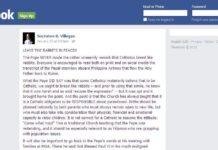HIS HOLINESS, Pope Francis, is a pontiff of many firsts. He’s the first pope from the Americas, where the Church remains a spiritual stronghold. He’s the first pope from the great but controversial Jesuit order. He’s the first to take the name Francis, after St. Francis, the humble friar from Assisi who shunned the riches of the world and founded the Order of Friars Minor.
The former archbishop of Buenos Aires, Jorge Mario Cardinal Bergoglio, will surely be contrasted with his predecessor, Benedict XVI, who renounced the papacy last February in what was also a first in more than six centuries. It’s easy to point out how the two differ in liturgy, or over how a pope is supposed to conduct himself. Pope Francis shed some of the trappings of his office the moment he stepped out of the balcony of St. Peter’s and broke tradition, for instance, by seeking the blessing of the crowd before giving his own Urbi et Orbi blessing. The now Pope Emeritus Benedict took pains to bring back and preserve tradition, to the point of being accused, unjustly, of turning back the clock on reforms ushered in by Vatican 2.
But where many see change, we see continuity.
The message of Pope Francis was clear from day one, notwithstanding the liberal media’s projections of their own agenda on the nascent papacy. Like the seal of his Jesuit order, which contains the first three letters (iota-eta-sigma) of the Greek name of Jesus, he wants Christ at the center of the Catholic faith. He has vowed, as Bishop of Rome, to lead the Universal Church in charity, while setting an example of humility.
What does he mean?
In his first homily as pope in the Missa pro Ecclesiae the day after his election, Pope Francis warned that unless “we confess Jesus Christ,” the Church “will become a pitiful NGO, but not the Church, the Bride of Christ.”
He quoted the French writer Leon Bloy: “Whoever does not pray to God, prays to the devil.” He added: “When one does not profess Jesus Christ, one professes the worldliness of the devil.” These are strong words in an era of political correctness and ideological tyranny disguised as tolerance.
On more than one occasion Bergoglio has proven himself a worthy son of St. Ignatius of Loyola, founder of the Jesuits, in adhering to the teachings of the Church founded by Christ. As one of the leading bishops of the Latin American Church, he drafted the 2007 Aparecida Document, which called for “eucharistic coherence.”
Addressing attacks on the dignity of life, the document said: “[W]e should be conscious that people cannot receive holy communion and at the same time act or speak against the commandments, in particular when abortion, euthanasia, and other serious crimes against life and family are facilitated. This responsibility applies particularly to legislators, governors, and health professionals.” Pope Francis calls abortion a “death sentence” on the unborn, euthanasia a discarding of the elderly, gay marriage a “move by the father of lies,” and gay adoption a form of discrimination against children.
Yet for Francis, the Church is compassionate. He baptized children born out of wedlock whose mothers had been turned away by priests. “Be merciful, the souls of the faithful need your mercy,” he told confessors at the Basilica of St. Mary Major in a surprise visit last March 14, his first act outside the walls of the Vatican.
In an audience with journalists last March 16, the Holy Father said wants a “poor Church, for the poor.” At a time when the Church finds it hard to get its message across because of the temporal goods in its possession, it can find a new credibility in Pope Francis, who, as cardinal, did away with his limousine and archbishop’s palace. He might be what the Church exactly needs at this point in its 2,000-year history.
Francis’s ascent to See of Peter actually fits right into the Year of Faith instituted by Benedict, who wanted the undiluted faith re-proposed to an increasingly Godless world. Francis’s message is also Benedict’s: a Christ-centered Church under a God who is love—Deus caritas est—the title of Benedict’s first encyclical.
Paying tribute to his predecessor, Francis said Benedict “lit a flame in the depths of our hearts that will continue to burn because it is fueled by his prayers that will support the Church on its missionary path.” He added: “In these years of his pontificate, he enriched and invigorated the Church with his magisterium, his goodness, guide and faith. His humility and his gentleness.”
The significance of a Jesuit’s election to the papacy, erstwhile thought to be improbable, was not lost on those familiar with the Church’s rich history. Bergoglio, former Jesuit provincial, suited up to the white simar used by popes since Pius V, who wanted to keep his white Dominican habit. At St. Mary Major, where Ignatius offered his first Mass, Pope Francis prayed before the tomb of Pius V, who reformed the Church and called the Council of Trent. Before the global media last March 16, he said he drew inspiration from Francis of Assisi. As the first Jesuit pope, he could well be a unifying force.
Habemus Papam! We have Francis! May the Lord preserve him, and give him life, and make him blessed upon the earth, and deliver him not up to the will of his enemies!










